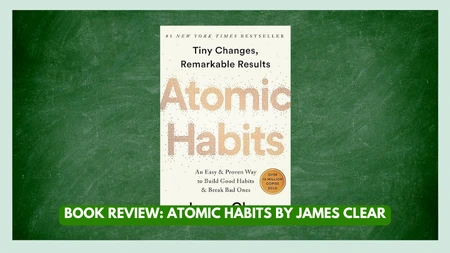No products in the cart.
Book Review
Book Review: Atomic Habits by James Clear
Atomic Habits: An Easy & Proven Ways to Build Good Habits and Break Bad Ones by James Clear
Book Category: Self Help Book Year Published: 2018
“Success is the product of daily habits not once-in-a-lifetime transformation.”
Anecdote
James Clear suffered a terrible accident that inspired him to develop his atomic habits theory. It took him over a year to recuperate after a classmate unintentionally struck him in the face with a baseball bat during his time in high school. It seems that Clear’s baseball ambitions were dashed. He was at the bottom of the roster, but as a freshman at college, he managed to make the baseball team. At this point, he began forming tiny, regular behaviors that would help him get closer to his objectives. He eventually developed a success model centered on developing several atomic habits due to these tiny routines.
Author profile

James Clear is a writer and speaker focusing on habits, decision-making, and lifelong learning. He is the author of the New York Times best-selling book, Atomic Habits. Over 5 million copies of the book have been sold globally and translated into over 50 languages. Clear is a frequent keynote speaker at Fortune 500 organizations, and his writing has appeared in publications such as Time magazine, the New York Times, the Wall Street Journal, and CBS This Morning. His famed “3-2-1” email newsletter is issued to over 1 million weekly readers.
15 Lessons from Atomic Habits
- Start small and focus on tiny habits. People often try to take bigger steps than they usually do. This typically results in failure. Instead of attempting to alter everything at once, incorporate a few small habits into your daily routine. Implementing this strategy will enhance your likelihood of achieving sustained success. Keep up the incredible work.
- Your Habits are a mirror of your identity. Establish a distinct environment and make your habits conscious. Implement visual cues and reminders throughout your environment to assist you in remembering and carrying out your desired behaviors. As a visual reminder, position a water bottle on your desk to increase your water intake. Staying on track and accomplishing one’s objectives is facilitated in this manner.
- Connect new behaviors with pre-existing ones via habit compounding. Complement a new habit that you wish to form with an established practice that you consistently observe. This process facilitates the establishment of the new routine and enhances its memorability.
- Make your habits attractive. Boost the appeal of your routines by incorporating elements of delight or rewards. To motivate yourself to exercise more, you could enhance the experience by listening to your preferred music or podcasts during your workout. Finding methods to make one’s habits enjoyable and rewarding is crucial.
- Make it easier to perform your routines by decreasing friction. Eliminate any impediments or barriers that hinder the execution of the habits you wish to cultivate.
- The Power of Rewards. Rewards make you satisfied. Your reward could be anything that you appreciate or are passionate about. Even a more modest accomplishment, such as checking a habit off your to-do list, can create joy. Reward yourself immediately upon the completion of the habit. Developing a habit sequence and the adage “don’t break the chain” can also provide that sense of fulfillment.
- Utilize habit formation to create a conducive environment for achievement. Adjust the setting to facilitate the practice of desired behaviors and deter temptations.
- Use the power of creating momentum. Habit gravity denotes the inherent propensity for routines to solidify and become increasingly automatic as time passes. Through consistently cultivating a habit, one can leverage this force to generate momentum, thereby facilitating the maintenance of the desired behaviors.
- Consistency is the key. The fundamental principle underlying the daily practice of self-improvement through incremental progress is consistency. Maintaining a new habit is more concerned with frequency than duration. One month from now, your progress will be more significant if you act daily as opposed to once per week.
- One can gain insight from their successes and failures by engaging in habit contemplation. Actively reflecting on one’s habits provides valuable insights into areas of success and areas that require refinement. Through analyzing one’s successes and failures, one can proactively adapt and make progress. It is a beneficial practice that actively aids in maintaining progress towards achievement.
- Systems are more important than goals. Everyone has a goal, but only a minority devotes the time and energy necessary to develop systems that will enable them to realize it.We must adhere to a system to succeed in our existence. Moreover, we can derive greater pleasure from the activity by utilizing systems. That is the most effective method to sustain our motivation over an extended period.
- Use habit substitution. Positive behaviors should be substituted for negative ones using habit substitution. Habit substitution entails deliberately identifying detrimental routines and their subsequent replacement with more favorable or health-promoting alternatives. This is a successful approach to liberating oneself from destructive routines and forming fresh, advantageous practices.
- Never Miss twice. Everyone misses one. Unforeseen circumstances or personal obligations may prevent us from improving our behavior. However, ensure that you never miss twice. Also, avoid overthinking it. Get back on course and continue making progress.
- By engaging in habit identity, one can harmonize their behaviors with the identity they wish to attain. It is highly motivating and purposeful to associate one’s behaviors with the individual they aspire to become. By deliberately aligning one’s routines with one’s values and aspirations, one can proactively mold one’s desired identity and effectuate constructive transformations.
- It’s Okay To Be A Beginner: being a beginner isn’t all bad. You want to be with experience, but the key is to learn from your errors without allowing them to bother you and to remember the worth of every skill. It’s okay to be a beginner. It’s part of the journey.
My Thoughts
Adopting atomic habits has the potential to bring about significant and enduring changes in our lives. Concentrating on making small, gradual improvements allows us to gain momentum and establish a basis for long-term success. These minor, regular actions not only aid us in reaching our objectives but also alter our self-image, bringing our actions into harmony with the person we aim to be. It is crucial to keep in mind that our daily habits, not one-time transformations, determine our destiny. Begin with small steps, maintain consistency, and witness how these atomic habits propel you towards greater achievements and a more enriching life.

![]()
4.6 out of 5 out of 161,091 ratings
If you like reading this, please like and share my page, DIARYNIGRACIA PAGE. Questions or suggestions, send them to diarynigracia@gmail.com You may also follow my Instagram account featuring microliterature, visit DIARYNIGRACIA INSTAGRAM.
READ MORE AND SHARE!
2023 Your Practical Wedding Guide
Investments and Finance Ultimate Guide
A Devotional Journal: Thankful from Within
Book Shop
Ultimate Stock Market
Investments and Finance Ultimate Guide
A Devotional Journal: Thankful from Within
Book Shop
Ultimate Stock Market

 FREE DOWNLOAD NOW!!!
FREE DOWNLOAD NOW!!!
Peace and love to you.